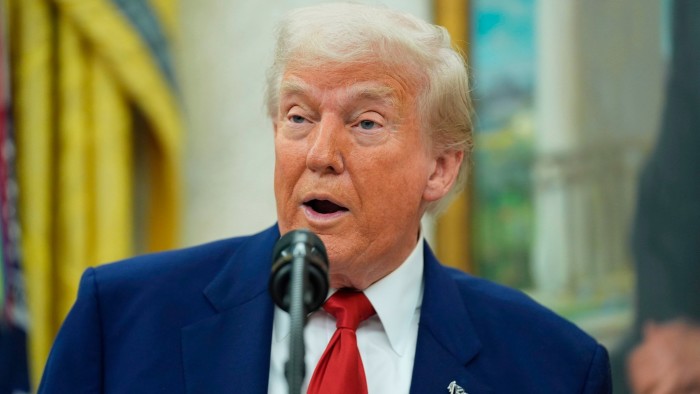This article is an on-site version of our FirstFT newsletter. Subscribers can sign up to our Asia, Europe/Africa or Americas edition to get the newsletter delivered every weekday morning. Explore all of our newsletters here
Good morning. Today we’ll be covering:
-
A US court’s ruling on Trump’s “liberation day” tariffs
-
Israel’s plan to establish 22 new settlements in the West Bank
-
Nvidia’s revenue surge
-
And one museum’s “spectacle of storage”
A US court has ruled Donald Trump’s “liberation day” tariff scheme illegal, finding that the president did not have the authority to use the emergency economic powers legislation to impose last month’s sweeping duties.
What happened: The US Court of International Trade voided the Trump administration’s April 2 tariffs, including the baseline 10 per cent rate and the higher “reciprocal” rates. A panel of judges declared the executive orders “invalid as contrary to law”, adding that they “exceed any authority granted to the President . . . to regulate importation by means of tariffs”. S&P 500 futures and the dollar rose on the news.
Why it matters: The decision challenges Trump’s assertion of executive power on global trade. Even if it is appealed, it will embolden opponents of the tariffs in corporate America, foreign capitals and US Congress who have been trying to persuade the administration to roll them back. Read the full story.
Here’s what else we’re keeping tabs on today:
-
Economic data: The US releases second first-quarter GDP estimates.
-
Results: Auto Trader, Bath & Body Works, Best Buy, Costco Wholesale, Dell Technologies, Gap, Hollywood Bowl, Nationwide Building Society and Royal Bank of Canada report.
Five more top stories
1. Elon Musk is formally stepping down from his role in the Trump administration after just five months, ending a tumultuous period during which he oversaw cost-cutting by the so-called Department of Government Efficiency. Musk originally pledged to cut $2tn of federal spending, but as of this month, Doge has only claimed $175bn in savings.
-
Billionaire ‘bromance’: Musk has agreed a $300mn deal with Telegram founder Pavel Durov to distribute xAI’s Grok chatbot to the messaging app’s 1bn users.
-
More Musk: Pension funds have demanded that the Tesla chief executive commit to work at least 40 hours a week at the company.
2. Secretary of state Marco Rubio has said the Trump administration would “aggressively” revoke the visas of Chinese students, in its latest effort to crack down on foreigners hoping to study in the US. The US would also revise criteria to enhance scrutiny of all future visa applications from China and Hong Kong, he said.
3. Israel has announced plans to establish 22 new settlements across the West Bank in what it called a “decisive response” to Palestinian militancy and as a stepping stone to fully annexing the region. About 3mn Palestinians live in the territory.
4. World Economic Forum founder Klaus Schwab has launched a criminal complaint against the whistleblowers whose accusations led to his ousting, as he steps up a campaign to clear his name of alleged impropriety at the organisation he led for more than half a century. Mercedes Ruehl reports from Geneva.
5. Nvidia reported a near 70 per cent surge in quarterly revenues, beating Wall Street estimates even as the chipmaker suffered a big hit to its business from new US restrictions on its China sales. Shares were up more than 4 per cent in after-hours trading after the company reported revenue of $44.1bn for the quarter to April 27.
The Big Read

South African President Cyril Ramaphosa may have survived a bruising encounter with Trump, but his country’s economy is struggling and he faces competing challenges at home and abroad. Is the veteran politician running out of time?
We’re also reading . . .
Chart of the day
The sale by seven banks last month of the final slug of loans for Musk’s $44bn Twitter buyout marked an extraordinary turnaround for debt that once appeared to be toxic. Read more on how the lenders’ decision to hold the debt eventually paid off.

Take a break from the news
Museum storage is almost always in nondescript warehouses. The Victoria and Albert Museum, however, has done something radical with its space in industrial east London. Rather than sticking to the usual secretive and secure interior, they have turned it into a spectacle of storage.



